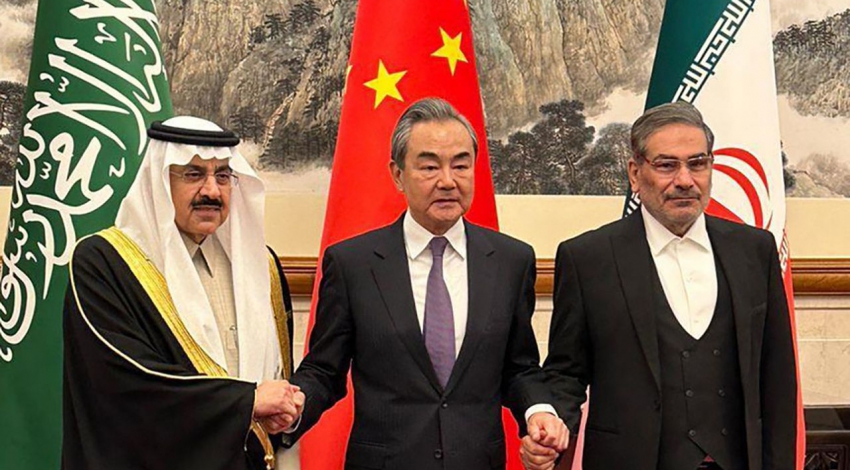Sunday 13 August 2023 - 22:48
Story Code : 404886
Iran-Saudi Arabia agreement a ground for regional convergence
Following Iran's President Raisi's trip to the Chinese capital of Beijing in February, Secretary of the Iranian Supreme National Security Council Ali Shamkhani started intensive talks with his Saudi counterpart on March 6 in Beijing for the purpose of finalizing a deal to resolve differences between the Islamic Republic and Saudi Arabia.
Finally after seven years of deadlock, at the end of the negotiations, a three-way statement was signed to this effect by Shamkhani, the Iranian security chief, Musaid bin Muhammad al-Ayban, Saudi Arabia�s security chief, and Wang Yi, a member of the Chinese State Council.
The Iran-Saudi Arabia agreement, seemingly, heralds a new era of convergence in the crises-hit region of the Middle East.
UN, EU welcome Iran-Saudi deal
The United Nations and the European Union have welcomed the announced agreement on the resumption of diplomatic ties between Iran and Saudi Arabia.
Spokesman of the United Nations Secretary-General St�phane Dujarric said �good neighborly ties between the two important countries �are essential for the stability� of the region.
On behalf of the UN Secretary-General Antonio Guterres, Dujarric stated the United Nations is ready �to further advance regional dialogue and to ensure durable peace and security� in the region.
The spokesperson for the European Union foreign policy chief has also welcomed the restoration of diplomatic relations between Iran and Saudi Arabia.
Russia hails Iran-Saudi Arabia deal
In a phone talk with his Iranian counterpart, Russian Foreign Minister Sergei Lavrov praised a recent agreement between Iran and Saudi Arabia to restore diplomatic relations.
The two foreign ministers also discussed the implementation of long-term cooperation agreements signed between Tehran and Moscow.
Turkey praises Iran-Saudi rapprochement
The foreign minister of Turkey said his country welcomes the agreement between Iran and Saudi Arabia on the restoration of diplomatic ties after seven years, highlighting the positive impacts of the deal on Muslim unity.
He expressed confidence that the deal will result in strengthening the position of the Muslim world and in creating synergy among Islamic countries for the purpose of helping resolve regional issues.
Iran-Saudi agreement key to stamping out 'external interference' in region: China
China has praised an agreement between Iran and Saudi Arabia to restore diplomatic relations after seven years of hostility, saying the pact will help regional countries to get rid of foreign interference and take the future into their own hands.
A Chinese Foreign Ministry spokesperson�said�on Saturday that the dialogue and agreement between Tehran and Riyadh "set a good example of how countries in the region can resolve disputes and differences and achieve good neighborliness and friendship through dialogue and consultation."
Iran-Saudi deal repercussions for Israel
Cited by�The Washington Post in an article that the daily published on Thursday, Henry Kissinger, former US Secretary of State, considered the deal would amount to "a substantial change in the strategic situation in the Middle East."
The Saudi-Iranian deal would complicate matters for the Israeli regime, said the Nixon-era top diplomat.
This was due to the fact that the occupying regime would no longer be able to try pressuring Iran as easily as it used to before the agreement was signed, he explained, adding that, "From now on, it would have to "take into account Chinese interests" if it wanted to keep trying to "[mount] pressure on Iran."
The author of the article,�Washington Post�foreign affairs columnist David Ignatius, also acknowledged that "the US is no longer the indispensable power in the region...�
It should be noted that less than a week into a key reconciliation pact with Saudi Arabia, the Islamic Republic sent its security chief to the United Arab Emirates, where he was received by UAE's President Sheikh Mohammed bin Zayed, in hopes of warmer ties, and unblocking Iran's assets.
Head of Iran's Supreme National Security Council, Ali Shamkhani, sat down with Emirati national security adviser Tahnoun bin Zayed Al Nahyan on Thursday to discuss a range of bilateral and regional issues.
"I do view this trip as a meaningful start for a new phase in political, economic and security relations," Shamkhani said. He expressed Iran's readiness for "constructive engagement" and called for "cooperation to replace hostility" in the Persian Gulf region.
Also, Shamkhani is set to visit Iraq for talks on ways to remove the obstacles to economic cooperation between the two neighbors, Nour News, a news portal affiliated with the SNSC reported.
By Fatemeh Khoshroo
# Tags











